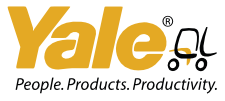More Advanced, More Productive, and Most Importantly, Safe
Forklift safety should always be top of mind, but as the impact of COVID-19 continues to pose unique challenges, safety efforts are under a brighter spotlight than ever.
It starts with fundamentals, like comprehensive operator training. Putting lift truck operators through training that complies with Occupational Safety and Health Administration (OSHA) standards, like the Yale® Handle with Care program, can help address what OSHA identifies as the cause of 70 percent of forklift accidents: operator error.
But technology is revolutionizing supply chains as they face immense pressure to perform. And while labor challenges, performance targets, and other forces are responsible for driving adoption of advanced technologies, operations must consider the effect introducing each new innovation can have on forklift safety.
Telemetry systems like the Yale Vision wireless asset management system can help both management and operators improve safety. Alerts notify management of fault codes, scheduled maintenance, or potentially hazardous driving behaviors. GPS data can help operations understand high-risk areas for collisions and take action to identify more efficient routes. For individual operators, telemetry can help guide them through automated OSHA pre-shift checks, restrict equipment access to only authorized individuals, and limit truck performance based on operator experience.
Robotics are an increasingly common presence in distribution centers, with robotic lift trucks able to automate repetitive warehouse tasks and work safely alongside human co-workers. A comprehensive package of laser scanners, sensors, cameras, and software enables robotic lift trucks to detect, avoid, and adapt to obstacles, helping to deliver the high levels of safety and productivity operations demand.
Of course, there’s also lift truck power. Some may understand how the right power source can boost performance, but not everyone recognizes that it can also be an important part of a thorough safety strategy. The right motive power source can help operations meet strict standards for hygiene and air quality and even help minimize the risk of repetitive-stress injuries.
It’s more important now than ever to invest in operator training on safe practices and leverage technology for both productivity and safety in the pursuit of a better safety culture. As safety gets smarter, warehouses get more productive. To learn more, go to http://www.yale.com/north-america/en-us/innovations/safety-and-training/National-Forklift-Safety-Day/ .
Contributed by Yale Materials Handling Corporation, www.yale.com
Related Articles
Copyright ©2024. All Rights ReservedDesign, CMS, Hosting & Web Development :: ePublishing
